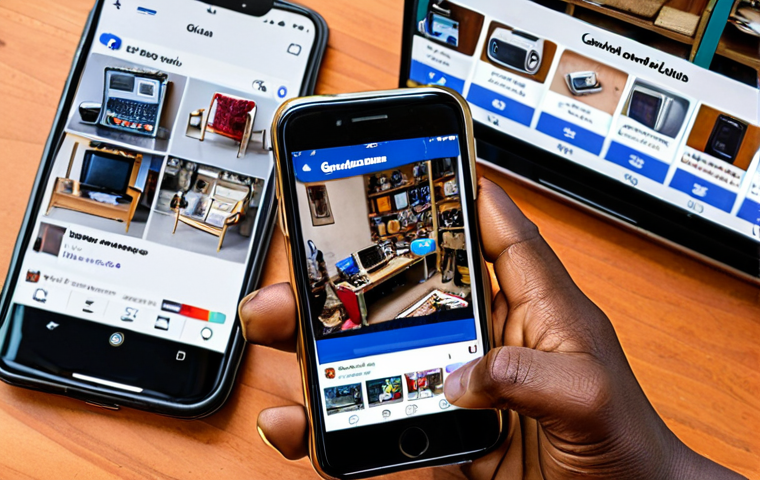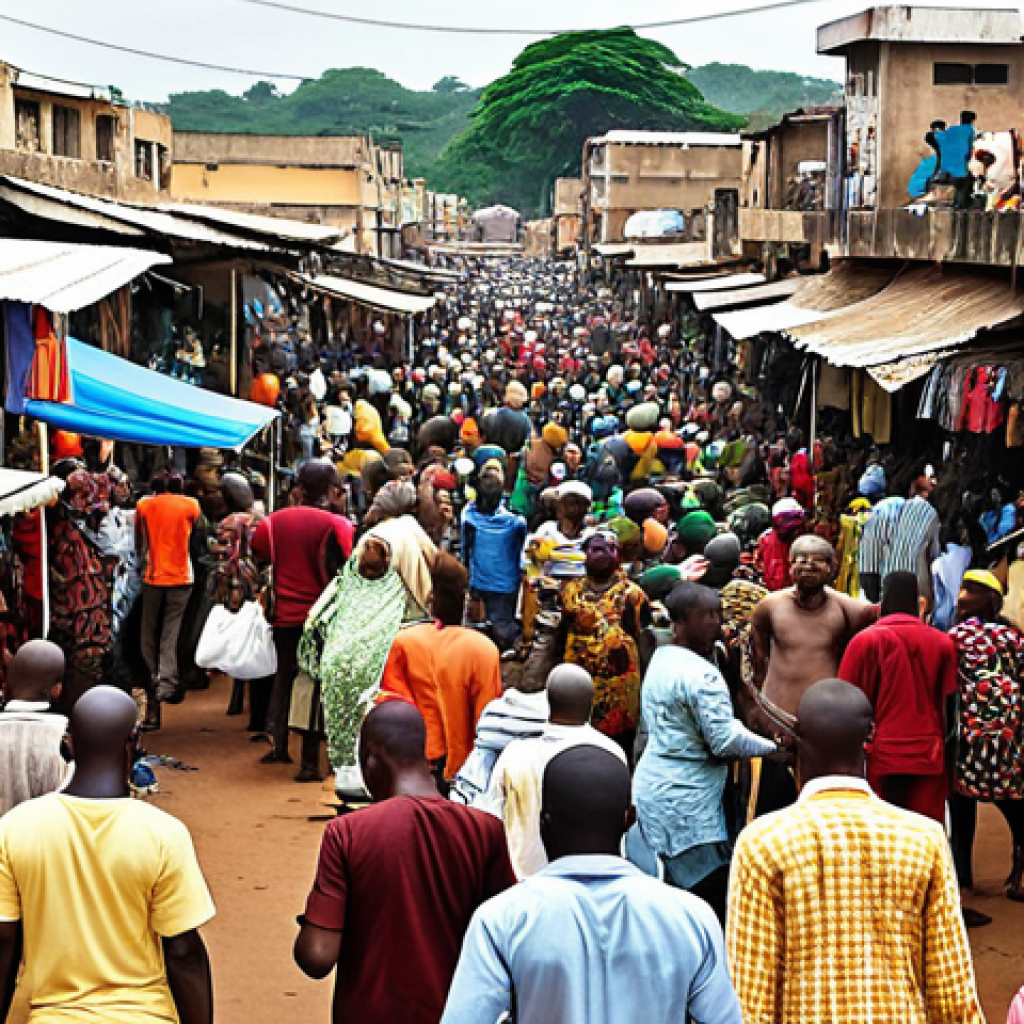Ever tried finding a decent deal in Guinea? It can feel like navigating a maze, right? From bustling markets overflowing with goods to online platforms just starting to gain traction, scoring quality used items takes a bit of know-how.
I remember once haggling for a second-hand motorbike; it was an adventure, to say the least! The key is knowing where to look and how to negotiate. With the growing trend of sustainable consumption and the rise of e-commerce in Africa, the landscape is constantly evolving.
What works today might be old news tomorrow. Let’s dive in to explore how to navigate the exciting world of buying and selling used goods in Guinea. Let’s find out exactly how to do it!
Navigating Guinea’s Second-Hand Scene
Unearthing Hidden Gems: Exploring Local Markets

Guinea’s markets are treasure troves, packed with everything from clothing to electronics. The key is knowing which markets are best for what you’re looking for.
I remember my first visit to Madina Market in Conakry; it was an explosion of colors, sounds, and smells. You can find practically anything there, but it takes patience and a keen eye to spot the real deals.
Don’t be afraid to haggle – it’s part of the culture!
Knowing Your Markets
1. Madina Market (Conakry): A sprawling hub for everything imaginable. Be prepared to spend hours navigating the crowded aisles.
2. Marché Niger (Conakry): Known for its fabrics and textiles, but also a decent spot for used clothing and household goods. 3.
Local Village Markets: Outside Conakry, smaller village markets often have unique, locally made items and used goods at very affordable prices.
Haggling Like a Pro
Negotiation is key. Start by offering a significantly lower price than what’s asked, and be prepared to walk away. Often, the vendor will call you back with a better offer.
I’ve found that being friendly and respectful goes a long way in getting a good deal.
Online Marketplaces: Guinea’s Digital Shift
The internet is changing how Guineans buy and sell used goods. Online platforms are becoming increasingly popular, especially among younger generations.
While still in its early stages compared to other African countries, e-commerce is definitely making its mark.
Facebook Marketplace: A Growing Force
Facebook Marketplace is gaining traction as a platform for buying and selling used items. Many Guineans use it to sell everything from furniture to electronics.
The advantage is that you can easily communicate with sellers and arrange meetups.
Classified Ads Websites
Several classified ads websites are popping up, catering to the Guinean market. These platforms offer a wider range of products, including vehicles, real estate, and electronics.
I recently found a great deal on a used refrigerator through one of these sites.
Safety Tips for Online Transactions
Always meet in a public place, and never send money in advance. Verify the seller’s identity if possible, and be wary of deals that seem too good to be true.
Trust your gut – if something feels off, it probably is.
The Art of Negotiation: Getting the Best Price
Negotiation is an essential skill when buying used goods in Guinea. Whether you’re in a bustling market or communicating with a seller online, knowing how to haggle can save you a significant amount of money.
Understanding the Seller’s Perspective
Put yourself in the seller’s shoes. Why are they selling the item? Are they in a hurry to get rid of it?
Understanding their motivation can give you an edge in the negotiation process.
Building Rapport
Being friendly and respectful can go a long way. Start with a polite greeting, and engage in some small talk before getting down to business. People are more likely to give you a better deal if they like you.
Walking Away
Don’t be afraid to walk away if you’re not happy with the price. Sometimes, the seller will call you back with a better offer. If not, there are plenty of other opportunities to find what you’re looking for.
Spotting Quality: Avoiding Common Pitfalls
Buying used goods comes with risks. It’s crucial to inspect items carefully and be aware of common scams. I once bought a used phone that turned out to be a fake; it was a hard lesson learned.
Thorough Inspection
Always inspect items thoroughly before making a purchase. Check for any signs of damage or wear and tear. Test electronics to make sure they’re working properly.
Asking the Right Questions
Don’t be afraid to ask the seller questions about the item’s history and condition. Why are they selling it? How long have they owned it?
Has it ever been repaired?
Trust Your Gut
If something seems too good to be true, it probably is. Be wary of deals that are significantly lower than the market value. Trust your instincts, and don’t be afraid to walk away if something feels off.
Sustainable Consumption: The Environmental Angle
Buying used goods is not just about saving money; it’s also about promoting sustainable consumption. By giving used items a second life, you’re reducing waste and minimizing your environmental impact.
Reducing Waste
When you buy used, you’re preventing items from ending up in landfills. This helps to conserve resources and reduce pollution.
Conserving Resources
Manufacturing new products requires a significant amount of energy and resources. By buying used, you’re reducing the demand for new products and conserving these resources.
Supporting a Circular Economy
Buying and selling used goods is a key component of a circular economy, where products are reused and recycled rather than discarded. This helps to create a more sustainable and resilient economy.
Guinea’s Unique Challenges: Overcoming Obstacles
Navigating the used goods market in Guinea comes with its own set of challenges. Infrastructure limitations, language barriers, and cultural norms can all present obstacles.
Infrastructure Limitations
Poor infrastructure can make it difficult to transport goods and access certain markets. Be prepared to travel long distances and deal with unreliable transportation.
Language Barriers
French is the official language of Guinea, but many people also speak local languages. If you don’t speak French, it can be challenging to communicate with sellers.
Cultural Norms
Understanding local customs and traditions is essential for successful negotiations. Be respectful of local customs, and be prepared to adapt your approach accordingly.
Table: Common Used Goods and Where to Find Them
| Item Category | Best Places to Find | Tips |
|---|---|---|
| Clothing | Madina Market, Marché Niger, Local Village Markets | Inspect for tears and stains, negotiate aggressively |
| Electronics | Online Classifieds, Facebook Marketplace, Specialized Shops | Test thoroughly, ask about warranty, beware of fakes |
| Furniture | Online Classifieds, Local Artisans, Estate Sales | Check for structural integrity, negotiate delivery |
| Vehicles | Online Classifieds, Dealerships, Private Sellers | Inspect engine, check paperwork, get a mechanic’s opinion |
| Household Goods | Madina Market, Marché Niger, Online Classifieds | Compare prices, check for functionality, negotiate bulk discounts |
Future Trends: The Evolution of Second-Hand Markets
The used goods market in Guinea is constantly evolving. As technology advances and consumer preferences change, new trends are emerging.
The Rise of Mobile Commerce
Mobile commerce is becoming increasingly popular in Guinea, as more people gain access to smartphones and mobile internet. Expect to see more buying and selling happening through mobile apps and platforms.
Increased Focus on Quality and Authenticity
As consumers become more aware of the risks associated with buying used goods, there will be a greater demand for quality and authenticity. Sellers who can provide guarantees and certifications will have a competitive advantage.
Sustainability as a Key Driver
Sustainability will continue to be a major driver of the used goods market. As more people become concerned about the environmental impact of their consumption, they will increasingly turn to used goods as a more sustainable alternative.
Navigating Guinea’s Second-Hand Scene
Unearthing Hidden Gems: Exploring Local Markets
Guinea’s markets are treasure troves, packed with everything from clothing to electronics. The key is knowing which markets are best for what you’re looking for. I remember my first visit to Madina Market in Conakry; it was an explosion of colors, sounds, and smells. You can find practically anything there, but it takes patience and a keen eye to spot the real deals. Don’t be afraid to haggle – it’s part of the culture!
Knowing Your Markets
- Madina Market (Conakry): A sprawling hub for everything imaginable. Be prepared to spend hours navigating the crowded aisles.
- Marché Niger (Conakry): Known for its fabrics and textiles, but also a decent spot for used clothing and household goods.
- Local Village Markets: Outside Conakry, smaller village markets often have unique, locally made items and used goods at very affordable prices.
Haggling Like a Pro
Negotiation is key. Start by offering a significantly lower price than what’s asked, and be prepared to walk away. Often, the vendor will call you back with a better offer. I’ve found that being friendly and respectful goes a long way in getting a good deal.
Online Marketplaces: Guinea’s Digital Shift
The internet is changing how Guineans buy and sell used goods. Online platforms are becoming increasingly popular, especially among younger generations. While still in its early stages compared to other African countries, e-commerce is definitely making its mark.
Facebook Marketplace: A Growing Force
Facebook Marketplace is gaining traction as a platform for buying and selling used items. Many Guineans use it to sell everything from furniture to electronics. The advantage is that you can easily communicate with sellers and arrange meetups.
Classified Ads Websites
Several classified ads websites are popping up, catering to the Guinean market. These platforms offer a wider range of products, including vehicles, real estate, and electronics. I recently found a great deal on a used refrigerator through one of these sites.
Safety Tips for Online Transactions
Always meet in a public place, and never send money in advance. Verify the seller’s identity if possible, and be wary of deals that seem too good to be true. Trust your gut – if something feels off, it probably is.
The Art of Negotiation: Getting the Best Price
Negotiation is an essential skill when buying used goods in Guinea. Whether you’re in a bustling market or communicating with a seller online, knowing how to haggle can save you a significant amount of money.
Understanding the Seller’s Perspective
Put yourself in the seller’s shoes. Why are they selling the item? Are they in a hurry to get rid of it? Understanding their motivation can give you an edge in the negotiation process.
Building Rapport
Being friendly and respectful can go a long way. Start with a polite greeting, and engage in some small talk before getting down to business. People are more likely to give you a better deal if they like you.
Walking Away
Don’t be afraid to walk away if you’re not happy with the price. Sometimes, the seller will call you back with a better offer. If not, there are plenty of other opportunities to find what you’re looking for.
Spotting Quality: Avoiding Common Pitfalls
Buying used goods comes with risks. It’s crucial to inspect items carefully and be aware of common scams. I once bought a used phone that turned out to be a fake; it was a hard lesson learned.
Thorough Inspection
Always inspect items thoroughly before making a purchase. Check for any signs of damage or wear and tear. Test electronics to make sure they’re working properly.
Asking the Right Questions
Don’t be afraid to ask the seller questions about the item’s history and condition. Why are they selling it? How long have they owned it? Has it ever been repaired?
Trust Your Gut
If something seems too good to be true, it probably is. Be wary of deals that are significantly lower than the market value. Trust your instincts, and don’t be afraid to walk away if something feels off.
Sustainable Consumption: The Environmental Angle
Buying used goods is not just about saving money; it’s also about promoting sustainable consumption. By giving used items a second life, you’re reducing waste and minimizing your environmental impact.
Reducing Waste
When you buy used, you’re preventing items from ending up in landfills. This helps to conserve resources and reduce pollution.
Conserving Resources
Manufacturing new products requires a significant amount of energy and resources. By buying used, you’re reducing the demand for new products and conserving these resources.
Supporting a Circular Economy
Buying and selling used goods is a key component of a circular economy, where products are reused and recycled rather than discarded. This helps to create a more sustainable and resilient economy.
Guinea’s Unique Challenges: Overcoming Obstacles
Navigating the used goods market in Guinea comes with its own set of challenges. Infrastructure limitations, language barriers, and cultural norms can all present obstacles.
Infrastructure Limitations
Poor infrastructure can make it difficult to transport goods and access certain markets. Be prepared to travel long distances and deal with unreliable transportation.
Language Barriers
French is the official language of Guinea, but many people also speak local languages. If you don’t speak French, it can be challenging to communicate with sellers.
Cultural Norms
Understanding local customs and traditions is essential for successful negotiations. Be respectful of local customs, and be prepared to adapt your approach accordingly.
Table: Common Used Goods and Where to Find Them
| Item Category | Best Places to Find | Tips |
|---|---|---|
| Clothing | Madina Market, Marché Niger, Local Village Markets | Inspect for tears and stains, negotiate aggressively |
| Electronics | Online Classifieds, Facebook Marketplace, Specialized Shops | Test thoroughly, ask about warranty, beware of fakes |
| Furniture | Online Classifieds, Local Artisans, Estate Sales | Check for structural integrity, negotiate delivery |
| Vehicles | Online Classifieds, Dealerships, Private Sellers | Inspect engine, check paperwork, get a mechanic’s opinion |
| Household Goods | Madina Market, Marché Niger, Online Classifieds | Compare prices, check for functionality, negotiate bulk discounts |
Future Trends: The Evolution of Second-Hand Markets
The used goods market in Guinea is constantly evolving. As technology advances and consumer preferences change, new trends are emerging.
The Rise of Mobile Commerce
Mobile commerce is becoming increasingly popular in Guinea, as more people gain access to smartphones and mobile internet. Expect to see more buying and selling happening through mobile apps and platforms.
Increased Focus on Quality and Authenticity
As consumers become more aware of the risks associated with buying used goods, there will be a greater demand for quality and authenticity. Sellers who can provide guarantees and certifications will have a competitive advantage.
Sustainability as a Key Driver
Sustainability will continue to be a major driver of the used goods market. As more people become concerned about the environmental impact of their consumption, they will increasingly turn to used goods as a more sustainable alternative.
In Conclusion
Exploring Guinea’s second-hand market is an adventure filled with potential rewards. From bustling local markets to emerging online platforms, there are opportunities for savvy shoppers and environmentally-conscious consumers alike. Embrace the experience, haggle with confidence, and discover the treasures that await!
Useful Tips
1. Always carry small denominations of Guinean Francs (GNF) for easier transactions in markets.
2. Learn a few basic French phrases to help with negotiations and building rapport.
3. Consider purchasing a local SIM card for convenient access to online marketplaces.
4. Visit markets early in the morning for the best selection and cooler temperatures.
5. Be aware of your surroundings and take precautions against petty theft in crowded areas.
Key Takeaways
Navigating Guinea’s second-hand market requires a blend of resourcefulness, cultural awareness, and caution. Whether you’re haggling in Madina Market or browsing online classifieds, understanding the local landscape and employing smart tactics can lead to rewarding finds and sustainable consumption.
Frequently Asked Questions (FAQ) 📖
Q: Where are the best places to hunt for good deals on used stuff in Guinea?
A: Alright, listen up! From my experience, you’ve got a few solid options. The sprawling markets, like Madina Market in Conakry, are treasure troves – just be prepared to dig!
I’ve snagged some amazing finds there, from clothing to household items. Then there’s word-of-mouth; ask around your network, you’d be surprised what people are looking to offload.
Also, keep an eye out for local classified ads – they’re usually posted in community centers or even at the local hangout spots, like the cafes. Finally, while e-commerce is still growing, keep an eye on online platforms like Jumia Deals or even Facebook Marketplace – they are becoming more popular.
Remember, patience and a keen eye are your best friends!
Q: What are some essential tips for negotiating prices when buying used goods?
A: Ah, negotiation – that’s where the fun (and the savings!) really begin. First off, always, ALWAYS do your homework. Knowing the original price and the current market value is key.
Don’t be afraid to start low; sellers often expect you to haggle. I usually start with an offer that’s around 60-70% of what I’m willing to pay. Be respectful, but firm.
Use humor to lighten the mood – a friendly joke can go a long way. Point out any flaws you see, but don’t be overly critical. And most importantly, be prepared to walk away.
Sometimes, the best deal is the one you don’t make. I learned that the hard way when I almost overpaid for a used generator!
Q: How can I ensure I’m buying quality used items and avoiding scams?
A: That’s a critical question, trust me, I’ve been burned before. First, inspect the item thoroughly – I mean, really thoroughly. Check for defects, signs of wear and tear, and anything that seems off.
If it’s electronic, test it out on the spot. Always ask questions about the item’s history and why the seller is getting rid of it. Meet in a public place, preferably during the day, for the transaction.
Avoid paying in full upfront; negotiate a partial payment or a trial period if possible. And if something feels fishy, trust your gut. I once almost bought a “brand new” phone that turned out to be a cleverly disguised brick – lesson learned!
Finally, get everything in writing – even a simple handwritten receipt can save you a lot of trouble down the line.
📚 References
Wikipedia Encyclopedia
구글 검색 결과
구글 검색 결과
구글 검색 결과
구글 검색 결과
구글 검색 결과


